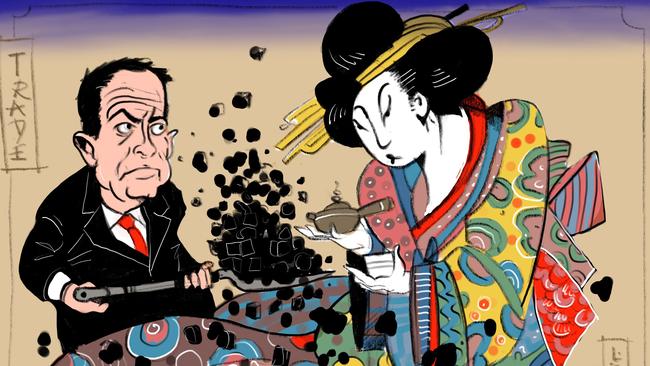
It is more than nine years since Kevin Rudd emerged from a meeting with European Commission president Jose Barroso to announce the Doha international trade agreement was “doable”. Like most of Rudd’s doable projects, little has been heard of it since.
Doha, that interminable round of multilateral navel gazing, had been running for six years when Rudd became prime minister. Audaciously Doha limps on, if one is to believe the World Trade Organisation’s website, which optimistically looks forward to “an agreement on modalities” followed by “schedules of commitments”.
It is the kind of transnational blather in which Rudd liked to immerse himself and that temperamentally suits his party, which seems to like the process of negotiating better than sealing the deal.
With the perspective of time, the Hawke-Keating governments seem like an aberration, an era in which the party recognised that the best form of job protection was flourishing enterprise with free access to international markets and capital. Yet Labor threatened to scupper the free trade deal with China and mocks Malcolm Turnbull for pursuing the Trans-Pacific Partnership. “It’s worse than a vanity project,” Shorten told the National Press Club last week.
Labor under Shorten wrestles with a paradox: its leaders imagine themselves as progressive, but hanker for a return to the past. They are internationalists when it comes to saving the planet, but stubbornly resist following the rest of the world by lowering company tax, a measure that would keep jobs onshore, which Shorten claims to want.
Indeed, it has been a while since a Labor leader has played the foreigners-stealing-jobs card as blatantly as Shorten did last week. “Too many work visas are being used as a low-cost substitute for employing an Australian,” he told the National Press Club. “Australian companies who do the right thing can’t compete with third world labour costs and conditions.”
Call it another paradox or call it outright hypocrisy; one moment he’s lecturing Donald Trump on his restrictive immigration policy and the next he is reviving Labor’s folk memory of third world hordes that have haunted the party since its creation. It is the sentiment that persuaded the NSW Labor government in the 1920s to legislate restrictions against Chinese labour, insisting that “all Chinese furniture and other manufactures be so stamped”.
It was Labor’s justification for opposing the groundbreaking Commerce Agreement with Japan, signed 60 years ago this July by Robert Menzies.
“Of the three parties, Labor is the only one that can be relied upon never to give way to Japanese cajolery, bluff and blackmail,” deputy opposition leader Arthur Calwell wrote in a newspaper article.
The trade deal, he said, was the latest humiliating betrayal of Australia’s vital interests that included allowing Japanese athletes to compete at the 1956 Olympic Games and the admission of 200 Japanese war brides, “thus breaking down one of the most vital principles of our White Australia policy”.
Calwell’s poisonous pen prompted Menzies to deliver as clear a statement of the benefits of free trade as one could ever wish to hear. Japan needed to export manufactured goods to Australia if it was to afford to import our wool; Australia needed export income to support local industries. Trade was a virtuous circle.
The era of open trade ushered in by the steady removal of tariff barriers has served Australia well over the past three decades, as former trade minister Andrew Robb points out in a foreword to a monograph published this week. Australians have enjoyed 25 years of continuous growth averaging 3.3 per cent with full employment, more or less, and steadily rising wages.
The gloomy forecasts of left-wing academics in the early 1990s of the end of employment as we know it have proved hopelessly wrong.
The old arguments that Australia would never prosper by exporting untransformed raw materials and that domestic manufacturing therefore needed supporting have proved utterly mistaken.
The arrangement by which we dig up iron ore and coal, ship them to Asian ports and receive smarter and cheaper consumer goods by return seems to have suited Australians well. There were few tears shed for the Ford Falcon when it ceased production last year, and no apparent rush to buy the last Holden Commodores as they trickle off the line, confirming Adam Smith’s theory that “the natural advantages which one country has over another in producing particular commodities are sometimes so great that it is acknowledged by all the world to be in vain to struggle with them”.
Amid the pessimism about the political obstacles to reform, the impact of the trade agreements struck with China, South Korea and Japan have been vastly underrated. Yet as the monograph’s author Andrew Bragg details, their benefits to Australian jobs and prosperity was real and immediate. Wine exports to China have risen by 60 per cent; lobster exports have tripled and powdered milk exports have doubled. The quantity of wine exported to Japan jumped 233 per cent in a single year; almond exports grew 12-fold and grape exports tenfold. The trade agreement with Korea delivered a $1 billion boost to the Australian economy.
The theoretical boost to the Australian economy that a WTO agreement was supposed to deliver has been achieved in practice by swiftly executed two-way deals that Labor in its present state of mind would never sign.
“As a country you’ve got to row your own boat in bilateral trade deals, or our economy risks missing out on coming waves of growth,” says Robb.
Shorten’s retreat on international trade, like his negative attitude to business more generally, renders empty his promise of “jobs, jobs, jobs”. None of his bright ideas, a compulsory quota for apprenticeships in government contracts, the investment of taxes in training, and restrictions on migration, will deliver a single extra wage packet in the stagnant economy he seems intent to deliver.
Nick Cater is executive director of the Menzies Research Centre. Fit for Service by Andrew Bragg is published this week by the Menzies Research Centre and Connor Court.


